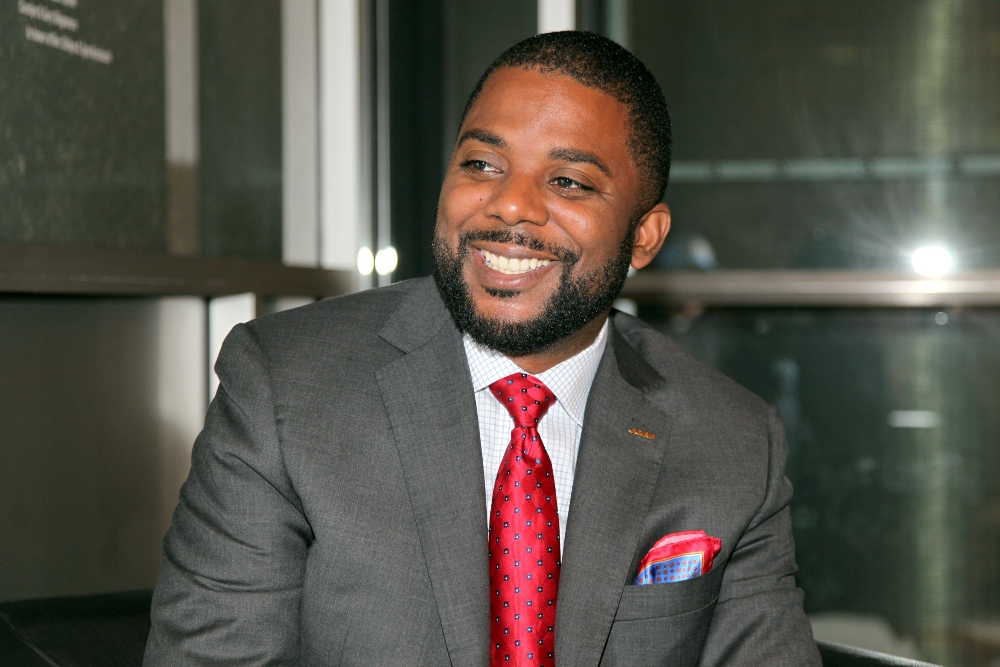
Photo by Aaron Salcido.
Rodney Harrell is Director of Livability Thought Leadership at AARP, where he leads AARP Public Policy Institute’s Livable Communities work. A graduate of Howard University, with graduate degrees from Princeton and the University of Maryland, he previously worked at the University of Maryland and as a governor’s fellow in the Maryland Department of Housing and Community Development. Before joining a Zócalo/AARP panel titled “Are Housing Prices Destroying the California Dream?” at the National Center for the Preservation of Democracy in downtown Los Angeles, Harrell discussed aging, apple pie, and his love for his hometown of Washington, D.C.
What is the first sound you hear when you wake up in the morning?
The morning news. I’m a typical D.C. political junkie.
What does it mean to be old?
That’s a very tough question. Old is always somebody who is older than you. It’s also a state where you don’t have things that work for you. The way I think about it now, you don’t necessarily get old if, for example, you have a home that is designed for you—if you’re not too old for the house. Being older is much more a situational thing than it is personal.
What is the last book you read?
Disrupt Aging: A Bold New Path to Living Your Best Life at Every Age, by JoAnn Jenkins. We need to disrupt the way we think about aging and think about it differently than we have in the past.
Do you spend 30 percent or more of your income on housing?
I don’t. It comes from having great financial advice and from my relatives, my father and uncle. I have a house that’s right near transit, I have transportation options. I put a lot of thought into where I live, since a large part of my work is to help to make it easier for other people to have their options.
If money were no object, where in the U.S. would you buy a home?
I live outside Washington, D.C., in Maryland. But honestly, I’d be in Newport Beach somewhere.
What dessert do you find impossible to resist?
Apple pie a la mode has got to be the perfect dessert. It’s a combination of hot and cold, sweet and neutral.
Where did you first learn to swim?
I first learned to swim in the neighborhood pool in Fort Lincoln in Washington, D.C.
What was the last thing that inspired you?
Honestly, I went to the Washington Nationals last week, and Steve Scalise, who was the congressman who got shot at the congressional baseball practice, threw out the first pitch for the game. D.C. can be a very partisan place, but everyone stood and cheered and he threw the ball to one of the Capitol Police who helped save them. That was an inspiring moment.
What was the most important thing you learned at Howard?
The most important thing was in a history class I had. I read and wrote about one of Bob Woodward’s books that talked about the presidency, and at first I got a poor grade. The professor said this isn’t really history. I said it was political history and we need to learn it for these reasons. I challenged him. If you feel that something is right, if you feel it makes sense to you, you should stand behind it. It was a small, character-building thing, and there have been bigger ones since—but that was the first time I bucked the system.
As an expert on neighborhoods and livability, when you visit a neighborhood that is new to you, what’s the first thing you look for?
The first thing I observe, frankly, is how the neighborhood and the people in it interact with one another. In a bad situation, you’ve got things that are designed that may be beautiful or flow well for vehicle traffic, but my first question is: Is this the kind of place that’s inviting for people, particularly for people to walk?
What does it mean to you to be American?
Being American means two things. It means freedom—the freedom to find your own destiny, to speak freely, to go your own path. Freedoms are enshrined in all our governing documents. At the same time, there’s a collective responsibility that you’re part of a team here. This great example of democracy was founded hundreds of years ago—it wasn’t perfect. And every succeeding generation from then has taken steps to better the American experiment. And those steps happen when we think of the fellow person—the idea that all Americans are neighbors and we look out for everyone.



